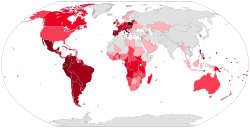Catholic Church in Bhutan
| Part of a series on the |
| Catholic Church by country |
|---|
 |
|
|
The Catholic Church in Bhutan is part of the worldwide Catholic Church, under the spiritual leadership of the Pope in Rome. The Kingdom of Bhutan falls under the jurisdiction of the Diocese of Darjeeling (India).
Origins
In 1627, two Portuguese Jesuits, Fathers Estêvão Cacella and João Cabral, traveling from Cochin and attempting to make a new route to the Jesuit mission in Shigatse, Tibet,[1] visited Bhutan. While in Bhutan, these Jesuits met Zhabdrung Ngawang Namgyal, the founder and religious leader of the Bhutanese state, and spent months in his court. The "Zhabdrung strongly encouraged the Jesuits to stay and even allowed them to use a room in Cheri [Monastery] as a chapel, granted them land in Paro to build a church and sent some of his own attendants to join the congregation. With no success in conversion and despite much discouragement from the Zhabdrung against their departure, the Jesuits eventually left for Tibet"[2] At the end of a stay of nearly eight months in the country, Cacella wrote a long letter from Cheri Monastery to his superior in Cochin in the Malabar Coast; it was a report, the Relação, relating the progress of their travels. Their visit is also corroborated in contemporaneous Bhutanese sources, including the biography of Zhabdrung Ngawang Namgyal himself.[3]
20th century
Two religious orders – the Jesuits in 1963 and the Salesians in 1965 – were invited to the country to open schools. Christianity was only officially allowed in 1965.[4] The Salesians were expelled in February 1982 on disputed charges of proselytism. The only Catholic missionary allowed to stay in the country – from 1963 until his death in 1995 – was the Canadian-born Bhutanese Jesuit Father William Mackey, who opened several secondary schools and the pre-university Sherubtse College. As his mission was to build up a modern educational system in the country he did not attempt any conversions.[5]
21st century

There are thought to be about 1,000 Catholics in the country where Christians of all denominations are subject to discrimination.[6] The official religion is Buddhism and Catholic missions have been denied entry.[7] On Palm Sunday, April 8, 2001, Bhutanese police went to churches and registered the names of believers and threatened one pastor with imprisonment after an interrogation.[8] It is illegal for Christians to hold public services and priests are often denied visas to enter the country.[9] The Constitution of Bhutan protects freedom of religion for Bhutanese citizens, but proselytism is forbidden. Article 7.4 states: "A Bhutanese citizen shall have the right to freedom of thought conscience and religion. No person shall be compelled to belong to another faith by means of coercion or inducement."[10]
The first Bhutanese-born Catholic priest, Rev Kinley Tshering, SJ, was ordained in 1986. He was initially dissuaded by missionaries but after a meeting with Mother Teresa he decided to become a Catholic priest.[11] As a citizen of the country, he travels freely in Bhutan, and celebrates the Christmas Mass under the pretext of his birthday on December 24.[12] He is also thought to be the first convert from Buddhism to the Christian faith in Bhutan.[13] Bhutan has never had a native Catholic hierarchical jurisdiction, but is covered by the Diocese of Darjeeling.[14][15]
The Archbishop of Guwahati in the neighbouring Indian state of Assam visited Catholics throughout the country in 2011 under the banner of a training program for young Bhutanese.[4]
See also
References
- ^ David M. Malone (March 2008). "Our Man in Bhutan". Literary Review of Canada. Archived from the original on April 21, 2008. Retrieved 2008-03-11.
- ^ Karma Phuntsho (2013). The History of Bhutan. Random House India. pp. 224–227. ISBN 9788184003116.
- ^ gTsang mKhan-chen ’Jam-dbyangs dPal-ldan rGyamtsho (c.1675). Dpal ’brug pa rin po che ngag dbang rnam rgyal gyi rnam par thar pa rgyas pa chos kyi sprin chen po’i dbyangs, in 5 parts (Ka - Ca) and a supplement (Cha).Reprint by Topden Tshering entitled The Detailed Biography of the First Zabs-drung Rinpoche of Bhutan Ngag-dbang-rnam-rgyal (Ngag-dbang-bdud-’joms-rdo-rje) (Dolanji, 1974, from the Punakha woodblocks of ca. 1797-1802)
- ^ a b UCA Editorial Staff (2011-03-28). "Glimmer of dawn for Bhutan's Christians". UCA News. Archived from the original on 2013-04-12. Retrieved 2013-02-14.
- ^ "Asia at a Glance". Fides. April 17, 1998. Archived from the original on 2006-06-13. Retrieved 2006-06-18.
- ^ Dubey, Prakash (February 23, 2006). "Almost no place for minority religions on Bhutan's national TV". Asianews.it. Archived from the original on September 29, 2007. Retrieved 2006-06-18.
- ^ "No masses and entry visas for Catholic priests". AsiaNews.it. January 20, 2004. Retrieved 2011-09-26.
- ^ "Christians Told To Leave Faith Or Leave Bhutan". Catholic World News. April 20, 2001. Retrieved 2006-06-18.
- ^ Coday, Dennis (January 16, 2004). "Bhutan bans public masses". Catholic National Reporter. Retrieved 2006-06-18.
- ^ The Constitution of the Kingdom of Bhutan (PDF). Royal Government of Bhutan. 2008. p. 14. Archived from the original (PDF) on 2014-09-05.
- ^ "Jesuit priest yearns to return to Buddhist homeland". Catholic News Agency. June 5, 2007. Retrieved 2008-03-11.
- ^ "No masses and entry visas for Catholic priests". AsiaNews.it. January 20, 2004. Archived from the original on November 28, 2005. Retrieved 2006-06-18.
- ^ "Bhutan's only Buddhist convert yearns to bring Catholicism to homeland". Union of Catholic Asian News. May 29, 2007. Archived from the original on September 1, 2007. Retrieved 2008-03-11.
- ^ "Chronology of Catholic Dioceses: Bhutan". katolsk.no. September 8, 2004. Retrieved 2008-03-11.
- ^ Prakash Dubey (October 27, 2006). "Only university graduates to run for office in Bhutan's first 'democratic' elections". asianews.it. Retrieved 2008-03-11.
